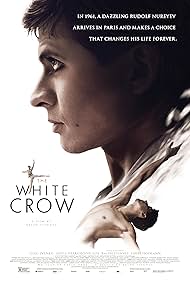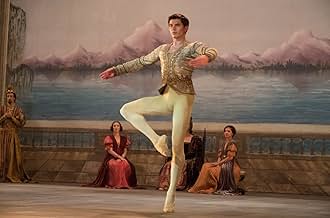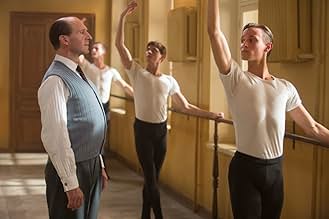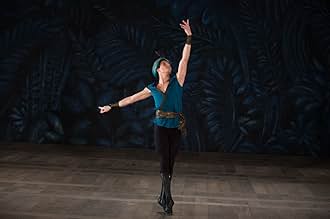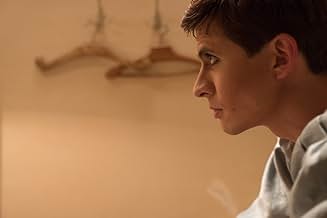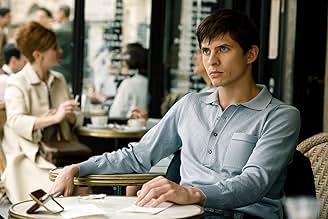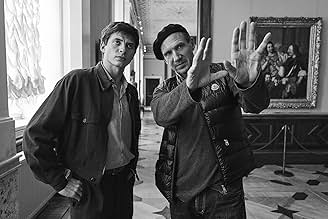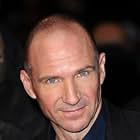IMDb RATING
6.6/10
7.1K
YOUR RATING
The story of Rudolf Nureyev's defection to the West.The story of Rudolf Nureyev's defection to the West.The story of Rudolf Nureyev's defection to the West.
- Awards
- 1 win & 4 nominations
- Director
- Writers
- All cast & crew
- Production, box office & more at IMDbPro
Storyline
Did you know
- TriviaHayden Christensen, who trained extensively in ballet as a child, was first choice to star; however a persistent ankle injury prevented him from being able to perform to the standards demanded by Ralph Fiennes.
- GoofsIn a scene showing a close up of Nureyev's foot performing a tendu, the shoe he is wearing is a white split sole ballet slipper, a shoe that did not exist in the 1960s. Split sole ballet technique shoes have only been on the dance scene since the mid 1990s.
- Quotes
Claire Motte: You are with the company? Did you dance tonight?
Rudolf Nureyev: If I had danced, you would remember.
- ConnectionsFeatured in The White Crow: Ralph Fiennes and Oleg Ivenko in Conversation (2019)
- SoundtracksLa Bayadère 3rd Shade Variation
Composed by Ludwig Minkus
Arranged by Matthias Gohl
Performed by Ilan Eshkeri and The London Metropolitan Orchestra
Featured review
'The White Crow' tells of Soviet ballet star Rudolf Nureyev's defection to the West in Paris, 1961. And of his years training in Leningrad. And of his poverty-stricken childhood. Three strands running concurrently through the film make for a busy production. The childhood scenes do little more than establish that Nureyev grew up surrounded by poverty and lots of snow. The Leningrad scenes show him as willing to work for his craft, but intense, self-centred and very arrogant - a proper little diva, in fact. Six years later, in Paris, he is still arrogant - demanding, for example, that a French female companion talk to a Russian waiter on his behalf because he suspects the man of looking down on him. But the intensity has weakened, replaced by an interest in what is around him and a happy curiosity in new things. This, however, does not please his KGB minders.
The film is the third from Ralph Fiennes wearing his director's hat. He does a pretty good job: the childhood scenes are shot in bleak, washed-out colours - almost black-and-white - a clever decision which creates atmosphere; and the climactic defection scene in Le Bourget Airport is heavy with tension. There *are* directoral flaws - something as simple as, for example, giving leading man Oleg Ivenko a different haircut for each era would have prevented this viewer's occasional confusion as to whether I was watching 1960s' Paris Nureyev or the 1950s' Leningrad version! And did we need quite so many extreme close-ups of Ivenko's face? But overall, director Fiennes does a good job...
... which makes it a shame that actor Fiennes turns in one of the weakest performances of the film. His portrayal of Nureyev's teacher Pushkin may, for all I know, be true to the real man, but I found it dreadfully studied and mannered, producing a caricature rather than a character (I will, however, give Fiennes full marks for delivering most of his lines in Russian!) Ukrainian dancer Ivenko, in what according to IMDb is his first acting role, turns in a more naturalistic performance, albeit within the confines of the generously-proportioned ego he is portraying. My personal favourite, however, was Chulpan Khamatova in a nicely-judged portrayal of Pushkin's wife Xenia, whose initial motherly interest in Nureyev (prompted by her husband's concern the stroppy teenager is not eating enough) develops over the course of the film.
Seen in preview at the British Film Institute, and - containing good pacing, an interesting story and nicely-rendered period detail - well worth it.
The film is the third from Ralph Fiennes wearing his director's hat. He does a pretty good job: the childhood scenes are shot in bleak, washed-out colours - almost black-and-white - a clever decision which creates atmosphere; and the climactic defection scene in Le Bourget Airport is heavy with tension. There *are* directoral flaws - something as simple as, for example, giving leading man Oleg Ivenko a different haircut for each era would have prevented this viewer's occasional confusion as to whether I was watching 1960s' Paris Nureyev or the 1950s' Leningrad version! And did we need quite so many extreme close-ups of Ivenko's face? But overall, director Fiennes does a good job...
... which makes it a shame that actor Fiennes turns in one of the weakest performances of the film. His portrayal of Nureyev's teacher Pushkin may, for all I know, be true to the real man, but I found it dreadfully studied and mannered, producing a caricature rather than a character (I will, however, give Fiennes full marks for delivering most of his lines in Russian!) Ukrainian dancer Ivenko, in what according to IMDb is his first acting role, turns in a more naturalistic performance, albeit within the confines of the generously-proportioned ego he is portraying. My personal favourite, however, was Chulpan Khamatova in a nicely-judged portrayal of Pushkin's wife Xenia, whose initial motherly interest in Nureyev (prompted by her husband's concern the stroppy teenager is not eating enough) develops over the course of the film.
Seen in preview at the British Film Institute, and - containing good pacing, an interesting story and nicely-rendered period detail - well worth it.
Details
- Release date
- Countries of origin
- Official sites
- Languages
- Also known as
- Beyaz Karga
- Filming locations
- Production companies
- See more company credits at IMDbPro
Box office
- Gross US & Canada
- $1,828,784
- Opening weekend US & Canada
- $78,782
- Apr 28, 2019
- Gross worldwide
- $7,622,595
- Runtime2 hours 7 minutes
- Color
- Aspect ratio
- 1.85 : 1
Contribute to this page
Suggest an edit or add missing content

